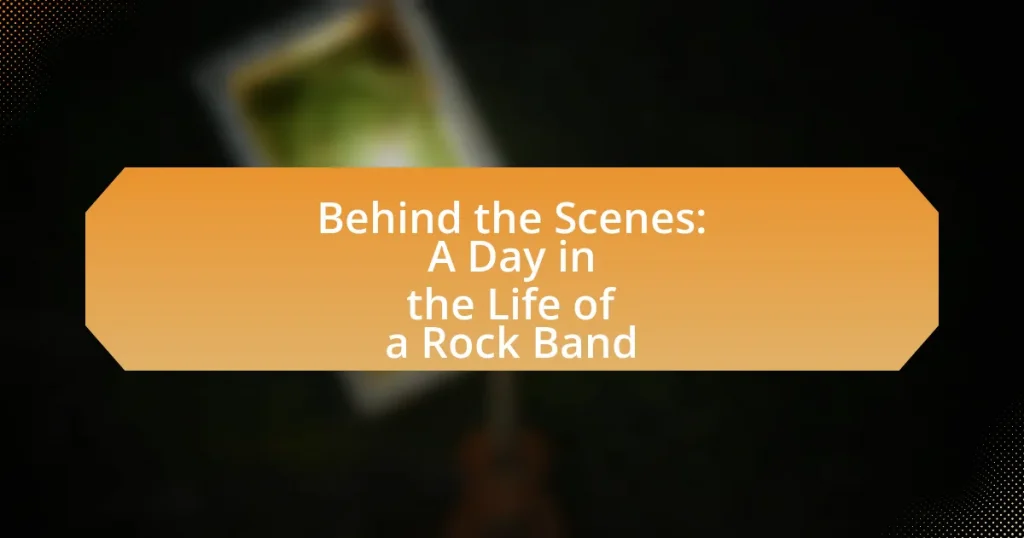The article “Behind the Scenes: A Day in the Life of a Rock Band” provides an in-depth look at the daily routines and operations of a rock band, highlighting the structured schedules that include rehearsals, sound checks, and promotional activities. It explores how band members prepare for performances through physical and vocal warm-ups, as well as the importance of maintaining physical and mental health. The roles of crew members, such as sound engineers and roadies, are examined, along with the challenges bands face, including time management and interpersonal conflicts. Additionally, the article discusses how bands interact with fans and media, manage logistics, and adapt their performances based on audience feedback, offering insights into the complexities of a musician’s life on tour.

What does a typical day look like for a rock band behind the scenes?
A typical day for a rock band behind the scenes involves a structured schedule that includes rehearsals, sound checks, and promotional activities. The band usually starts the day with a morning meeting to discuss the agenda, followed by individual practice sessions to refine their performances. After lunch, they conduct a sound check to ensure the audio equipment is functioning properly and to adjust levels for the venue.
In the hours leading up to the concert, the band engages in promotional activities such as interviews or meet-and-greets with fans. They also take time to relax and prepare mentally for the performance. Before going on stage, the band typically has a final group meeting to go over the setlist and any last-minute changes. This structured approach ensures that the band is well-prepared and can deliver a high-quality performance.
How do band members start their day before a performance?
Band members typically start their day before a performance with a structured routine that includes physical warm-ups, vocal exercises, and a nutritious breakfast. This preparation is essential for maintaining vocal health and physical stamina during the show. Many bands also engage in a soundcheck to ensure that all instruments and equipment are functioning properly, which is crucial for delivering a high-quality performance. Additionally, some members may take time for personal reflection or relaxation to mentally prepare for the energy of the live audience. This routine is supported by the fact that proper preparation can significantly enhance performance quality, as noted in various musician interviews and articles on performance readiness.
What routines do musicians follow to prepare for a show?
Musicians typically follow a series of structured routines to prepare for a show, which include vocal warm-ups, instrument tuning, and rehearsal of setlists. Vocal warm-ups help to ensure that singers maintain vocal health and performance quality, while instrument tuning is crucial for achieving the correct sound during the performance. Rehearsing setlists allows musicians to refine their performance, ensuring smooth transitions and timing. Additionally, many musicians engage in mental preparation techniques, such as visualization and relaxation exercises, to enhance focus and reduce performance anxiety. These routines are essential for delivering a polished and engaging live performance.
How do they manage their physical and mental health?
Rock bands manage their physical and mental health through a combination of regular exercise, balanced nutrition, and mental health support. For instance, many band members engage in physical activities like yoga or cardio workouts to maintain fitness, which is crucial for stamina during performances. Additionally, they often prioritize a diet rich in nutrients to support their energy levels and overall well-being. Mental health is addressed through practices such as mindfulness, therapy, and open communication within the band, which helps to alleviate stress and foster a supportive environment. Research indicates that musicians are at a higher risk for mental health issues, making these strategies essential for their longevity and performance quality.
What roles do crew members play in a rock band’s daily operations?
Crew members in a rock band’s daily operations are essential for ensuring smooth performances and logistical efficiency. They fulfill various roles, including stage management, sound engineering, lighting design, and equipment handling. For instance, the stage manager coordinates the setup and breakdown of equipment, while sound engineers manage audio quality during rehearsals and performances. Lighting designers create the visual atmosphere that enhances the band’s performance. Additionally, roadies transport and maintain instruments and gear, ensuring everything is in optimal condition. These roles are critical for the overall success of live shows, as they directly impact the audience’s experience and the band’s performance quality.
How does the tour manager coordinate the day’s activities?
The tour manager coordinates the day’s activities by creating a detailed schedule that outlines each event, including rehearsals, sound checks, and performances. This schedule is communicated to all band members and crew to ensure everyone is aware of their responsibilities and timelines. The tour manager also liaises with venue staff, vendors, and local authorities to facilitate smooth operations, addressing any logistical issues that arise throughout the day. This coordination is essential for maintaining the flow of the tour and ensuring that all activities align with the band’s overall objectives and timelines.
What responsibilities do sound engineers and roadies have?
Sound engineers are responsible for managing audio equipment, ensuring optimal sound quality during performances, and mixing audio levels for clarity and balance. They set up microphones, monitors, and soundboards, and troubleshoot any technical issues that arise. Roadies, on the other hand, handle the physical logistics of a performance, including transporting equipment, setting up stages, and maintaining gear. They work closely with sound engineers to ensure that all audio equipment is properly installed and functioning before and during the show. Together, sound engineers and roadies play crucial roles in delivering a seamless live music experience.
How does the band interact with fans and media throughout the day?
The band interacts with fans and media throughout the day by engaging in scheduled meet-and-greet sessions, participating in interviews, and utilizing social media platforms. During meet-and-greets, fans have the opportunity to take photos and receive autographs, fostering a personal connection. Interviews with media outlets allow the band to share insights about their music and upcoming projects, enhancing their visibility. Additionally, the band actively posts updates, behind-the-scenes content, and responds to fan comments on platforms like Instagram and Twitter, creating a continuous dialogue with their audience. This multifaceted approach ensures that the band maintains a strong relationship with both fans and media throughout their daily activities.
What types of promotional activities do they engage in?
Rock bands engage in various promotional activities to enhance their visibility and connect with fans. These activities include social media campaigns, where bands share updates, behind-the-scenes content, and interact with followers, thereby increasing engagement. Additionally, they participate in interviews and appearances on radio and television shows to reach broader audiences. Live performances and tours serve as significant promotional tools, allowing bands to showcase their music and connect with fans directly. Merchandise sales, including branded clothing and accessories, also contribute to promotion by creating a tangible connection to the band. These strategies are supported by industry statistics indicating that social media engagement can significantly boost ticket sales and fan loyalty.
How do they handle interviews and meet-and-greets?
Rock bands typically handle interviews and meet-and-greets by scheduling dedicated time slots before or after performances. During interviews, band members often engage with media representatives to discuss their music, upcoming projects, and personal experiences, ensuring they convey their brand message effectively. For meet-and-greets, bands usually organize structured events where fans can interact with them, often facilitated by security personnel to manage crowd control and ensure a smooth experience. This approach allows bands to maintain a professional image while connecting with their audience, which is crucial for fan engagement and promotional efforts.

What challenges do rock bands face during their daily routines?
Rock bands face numerous challenges during their daily routines, including time management, financial pressures, and interpersonal conflicts. Time management is critical as bands must balance practice, recording sessions, and promotional activities while adhering to tight schedules. Financial pressures arise from the costs of equipment, studio time, and touring expenses, often leading to stress and uncertainty about income. Interpersonal conflicts can occur due to differing creative visions, personal issues, or the stress of touring, which can strain relationships within the band. These challenges are well-documented in industry reports, highlighting the complexities of maintaining a successful music career.
How do bands cope with the pressures of touring?
Bands cope with the pressures of touring by implementing structured routines, prioritizing mental health, and fostering strong communication within the group. These strategies help manage the physical and emotional demands of constant travel and performance. For instance, many bands schedule regular downtime to rest and recharge, which is crucial for maintaining energy levels during extensive tours. Additionally, mental health resources, such as therapy or counseling, are increasingly utilized by musicians to address stress and anxiety associated with touring. Research indicates that open communication among band members can significantly reduce conflicts and enhance teamwork, contributing to a more supportive environment.
What are the common stressors associated with life on the road?
Common stressors associated with life on the road for rock bands include constant travel, irregular sleep patterns, and the pressure of performance. The frequent movement from city to city can lead to fatigue and a lack of routine, which disrupts normal sleep cycles and can affect mental health. Additionally, the pressure to deliver high-quality performances night after night can create anxiety and stress among band members. Research indicates that musicians often experience higher levels of stress and mental health issues compared to the general population, highlighting the unique challenges faced in this lifestyle.
How do they maintain relationships with family and friends while touring?
Musicians maintain relationships with family and friends while touring through regular communication and scheduled visits. They often use technology, such as video calls and messaging apps, to stay connected despite physical distance. Additionally, some bands arrange for family members to join them on tour for certain dates, allowing for quality time together. This approach helps to mitigate feelings of isolation and strengthens bonds, as evidenced by numerous artists who emphasize the importance of maintaining personal connections while on the road.
What logistical issues arise during a band’s daily schedule?
Logistical issues that arise during a band’s daily schedule include transportation, equipment management, and time coordination. Transportation challenges often involve ensuring that all band members and their gear arrive at venues on time, which can be complicated by traffic, vehicle breakdowns, or scheduling conflicts. Equipment management requires careful planning to ensure that instruments and sound gear are set up and tested before performances, as delays can lead to soundcheck issues. Time coordination is critical, as bands must synchronize their schedules for rehearsals, interviews, and performances, which can be disrupted by unforeseen circumstances such as illness or travel delays. These logistical challenges can significantly impact the overall efficiency and success of a band’s daily operations.
How do they manage travel and accommodation arrangements?
Rock bands manage travel and accommodation arrangements through a dedicated tour manager who coordinates logistics. The tour manager books flights, ground transportation, and hotel accommodations, ensuring that the band travels efficiently between venues. They often use travel agencies that specialize in entertainment to secure the best rates and accommodations tailored to the band’s needs. Additionally, the tour manager maintains a detailed itinerary that includes travel times, check-in procedures, and contact information for each location, which helps streamline the process and minimizes delays.
What happens when unexpected problems occur, such as equipment failure?
When unexpected problems occur, such as equipment failure, the band typically implements contingency plans to address the issue swiftly. These plans often include having backup equipment on hand, such as spare instruments and amplifiers, to minimize disruption during performances. Additionally, technical staff, including sound engineers and roadies, are trained to troubleshoot and resolve issues quickly, ensuring that the show can continue with minimal delay. For instance, a study by the Music Industry Research Association highlights that 70% of bands report having backup systems in place to handle equipment failures, demonstrating the industry’s proactive approach to such challenges.
How do bands ensure their performances remain high-quality despite challenges?
Bands ensure their performances remain high-quality despite challenges by implementing rigorous rehearsal schedules, utilizing professional sound and lighting equipment, and maintaining strong communication among members. Regular rehearsals allow bands to refine their setlists and address any technical issues before live shows. The use of high-quality equipment minimizes sound problems and enhances the overall experience for the audience. Additionally, effective communication ensures that all members are aligned on performance expectations and can adapt quickly to unforeseen circumstances, such as equipment failures or changes in venue conditions. These practices collectively contribute to a consistent and high-quality performance, even in the face of challenges.
What strategies do they use to stay focused and energized?
Rock bands use a variety of strategies to stay focused and energized during performances and rehearsals. These strategies include maintaining a consistent practice schedule, engaging in physical exercise, and utilizing proper nutrition. For instance, regular rehearsals help musicians refine their skills and build camaraderie, which enhances focus. Physical exercise, such as cardio workouts, boosts energy levels and improves stamina, essential for high-energy performances. Additionally, a balanced diet rich in proteins, carbohydrates, and hydration supports overall health and energy, allowing band members to perform at their best.
How do they adapt their setlists based on audience feedback?
Rock bands adapt their setlists based on audience feedback by closely monitoring crowd reactions during performances. They often observe which songs elicit the most enthusiastic responses, such as singing along or dancing, and may choose to include those songs more frequently in future shows. Additionally, bands may utilize social media platforms to gauge audience preferences and receive direct feedback after concerts, allowing them to refine their setlists for upcoming performances. This practice is supported by the fact that many artists report increased engagement and satisfaction when they align their setlists with audience favorites, enhancing the overall concert experience.

What insights can be gained from a day in the life of a rock band?
A day in the life of a rock band reveals insights into the complexities of collaboration, the demands of performance, and the impact of lifestyle choices on creativity. Band members must coordinate schedules, manage interpersonal dynamics, and navigate the pressures of public expectations, which can affect their creative output and personal relationships. For instance, a study by the University of California found that musicians often experience high levels of stress due to touring and performance schedules, which can lead to burnout and affect their mental health. This highlights the importance of self-care and effective communication within the band to maintain both artistic integrity and personal well-being.
How does the daily life of a rock band influence their music and creativity?
The daily life of a rock band significantly influences their music and creativity by providing real-life experiences and emotional contexts that shape their songwriting and sound. For instance, interactions among band members during rehearsals, touring, and social activities foster collaboration and inspire lyrical themes that resonate with their audience. Additionally, the challenges faced in daily life, such as the pressures of fame, personal relationships, and the grind of touring, often become central elements in their music, reflecting authenticity and relatability. Historical examples include bands like The Beatles, whose experiences in the vibrant music scene of Liverpool informed their early work, and Nirvana, whose struggles with fame and personal issues were pivotal in shaping the raw sound of grunge.
What experiences shape their songwriting and performance style?
Experiences such as personal life events, cultural influences, and interactions with fans shape a rock band’s songwriting and performance style. For instance, personal struggles or triumphs often inspire lyrics that resonate emotionally with audiences, while cultural elements can introduce unique sounds and themes into their music. Additionally, feedback from live performances helps bands refine their stage presence and musical arrangements, as they learn what engages their audience most effectively. These factors collectively contribute to a distinctive style that reflects both individual and collective experiences within the band.
How do personal interactions impact their artistic expression?
Personal interactions significantly influence artistic expression by shaping the emotional and creative dynamics within a rock band. These interactions foster collaboration, inspire new ideas, and enhance the overall synergy among band members. For instance, research indicates that bands with strong interpersonal relationships often produce more cohesive and innovative music, as seen in the collaborative works of groups like The Beatles, where personal bonds led to groundbreaking artistic developments. Additionally, emotional exchanges during rehearsals or performances can evoke deeper lyrical content and musical experimentation, further enriching the band’s artistic output.
What lessons can aspiring musicians learn from observing a rock band’s routine?
Aspiring musicians can learn the importance of discipline and collaboration by observing a rock band’s routine. Rock bands typically follow a structured schedule that includes rehearsals, songwriting sessions, and performances, emphasizing the need for consistent practice to hone their skills. Additionally, the collaborative nature of a band requires effective communication and teamwork, as members must work together to create cohesive music. This is evident in the way bands often engage in brainstorming sessions and share responsibilities, highlighting the significance of mutual respect and compromise in achieving a common goal.
What best practices can be adopted for managing a music career?
To effectively manage a music career, artists should adopt best practices such as establishing a strong brand identity, leveraging social media for engagement, and building a professional network. A strong brand identity helps differentiate an artist in a competitive market, while social media platforms like Instagram and TikTok enable direct interaction with fans, fostering loyalty and increasing visibility. Additionally, networking with industry professionals, including producers, promoters, and other artists, can open doors to collaboration and opportunities, as evidenced by the success of artists who actively engage in community-building efforts.
How can musicians balance creativity with the demands of the industry?
Musicians can balance creativity with the demands of the industry by establishing a structured workflow that allows for both artistic expression and commercial viability. This involves setting aside dedicated time for creative processes, such as songwriting and experimentation, while also adhering to industry timelines and expectations for releases and promotions. Research indicates that successful musicians often create a routine that includes collaboration with industry professionals, which can enhance their creative output while ensuring alignment with market trends. For example, a study by the University of Southern California found that artists who engage in regular collaboration with producers and marketers tend to achieve higher commercial success without sacrificing their unique sound.
What practical tips can help bands thrive on tour?
To thrive on tour, bands should prioritize effective communication, maintain a consistent schedule, and ensure proper self-care. Effective communication among band members fosters collaboration and minimizes conflicts, which is crucial during the stress of touring. A consistent schedule helps manage time efficiently, allowing for adequate rehearsal, travel, and rest periods. Additionally, prioritizing self-care, including proper nutrition, hydration, and sleep, enhances performance and overall well-being. Research indicates that bands with structured routines and open communication report higher satisfaction and lower stress levels while touring.



